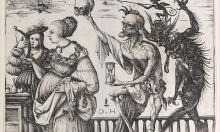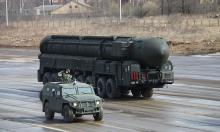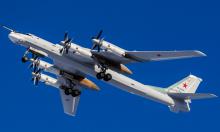Forbes: Why Russians Are Clever, But Poor
Official statistics in Russia reveals although insignificant, but still notable improvement in wellbeing of ordinary Russians. It is reported that real incomes of the population have allegedly increased (inflation rate isn’t taken into consideration at that), and real basket of goods has increased and ruble and currency deposits are said to have increased in Russia’s Sberbank (Savings Bank). However, the matter of the fact is that Russia holds stunning records quite in a different sphere: the number of dollar multi-millionaires is increasing in this country every year. America’s Forbes rated only seven multi-millionaires in Russia last year, but this year the results has already increased up to 17. At that, majority of the last year’s millionaires already doubled their fortunes.
Actual cash incomes of the Russian population after deduction of obligatory payments and updated in accordance with the Consumer Price Index reduced by 29.1% in January 2003 as compared with the previous month, although they are still 16.4% higher as compared with January 2002. This is reported by the RF Statistics Committee.
An average income per head of Russians made up 3.868 rubles, which is 33.6% more than in January 2002, but it is 28.3% less than in December 2002. It means that on the New Year’s eve people saved some money to celebrate the holiday very well, but when people spent their money, in January the situation in the country got back to the previously fixed results (to the poverty level of the previous year).
In accordance with the provisional data, an average accrual nominal wage in Russia reduced by 861 rubles, or about 15%, in January 2003 as compared with the previous month, and made up 4.877 rubles (it is 29.5% higher than in January 2002). The actual average monthly wage in January 2003 reduced by 16.6% as compared with December 2002 (which is at the same time 17% higher than in January 2002).
The Russian Government estimated a living wage for the last three months of 2002 at the rate of 1.893 rubles per head; the living wage made up 1.817 rubles per head in the third quarter of the previous year.
Population with the average income lower than the living wage in Russia on the whole reduced from 35.4 million people in the third quarter of 2002 to 30.9 million people in the fourth quarter of the previous year, which made up 21.6% of the whole population of Russia.
What do we have as a result? Real incomes of the Russian population are said to have increased by more than 16%; an income per head made up 3.868 rubles (it is a bit more than 100 dollars). The last year’s living wage made up 1.808 rubles per month on average. Such are the conclusions of the official statistics. This is how the whole of the country lived last year, but not all people.
Every year America’s magazine Forbes publishes the list ofthe planet’s richest people. This year the rating consists of 476 multi-millionaires from 43 countries with their total fortunes at the rate of 1.4 trillion dollars. As American experts state, Russian money-bags were the most successful with “personal profiteering” this time. This might have been considered pleasant but for one snag. Ordinary Russians cannot be proud of the increasing number of Russian money-bags at the time when we see old ladies begging everywhere in the streets and in the metro. And probably these old women were selflessly working during WWII to help the country beat the enemy. This must be a shame for some people to be so much rich at the time when some part of the population is living below the poverty line.
As for the Forbes rating, president of the Russian oil company YUKOS Mikhail Khodorkosvky, former owner of Menatep bank and the chief lobbyist of construction of the Angarsk-Datsin oil pipeline going to China, takes the 26th position. His fortune is speedily increasing. Forbes supposes that the businessman grew two times richer within a year. The magazine estimates his fortune at the rate of 8 billion dollars (the sum was 3.7 billion last year). Then goes Chukotka governor, businessmen Roman Abramovich, the actual owner of the Sibneft oil company, co-owner of the Russian Aluminum holding (he is also said to be the chief “treasurer” of Yeltsin’s Family). The businessman with his fortune at the rate of 5.7 billion dollars takes the 49th position in the rating. Then, in accordance with the magazine’s rating go the following Russians: Mikhail Fridman (4.3 billion, Alfa-Group), Viktor Vekselberg (2.5 billion, TNK oil company), Vladimir Potanin (1.8 billion, Interros), Mikhail Prokhorov (1.6 billion, Norilsk Nickel), Oleg Deripaska (1.5 billion, RusAl), Vladimir Yevtushenkov (1.5 billion, Sistema financial company), Vagit Alekperov (LUKOIL, 1.3 billion dollars), Alexey Mordashev (1.2 billion, Severstal), Leonid Nevzlin (YUKOS) and Yeugeny Shvidler (each has 1.1 billion), Vladimir Bogdanov (Surgutneftegas), Mikhail Brudno, Vladimir Dubov, Platon Lebedev, Vasily Shakhnovsky (all are from YUKOS, each owns 1 billion).
Experts of the American magazine think that majority of the Russian businessmen rated in Forbes for the first time were included into the rating due to a sudden bounce of oil prices. In any other normal country (Norway or Saudi Arabia) this advantageous price conjuncture would have certainly improved living conditions and wellbeing of majority of the population. But not in this country, where only few people made fortunes on this favorable situation.
Kira Poznakhirko PRAVDA.Ru
Translated by Maria Gousseva
Read the original in Russian: https://www.pravda.ru/economics/36131-bigmoney/
Related links:
Subscribe to Pravda.Ru Telegram channel, Facebook, RSS!




